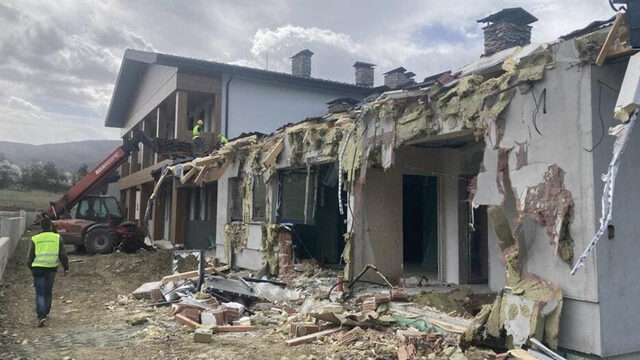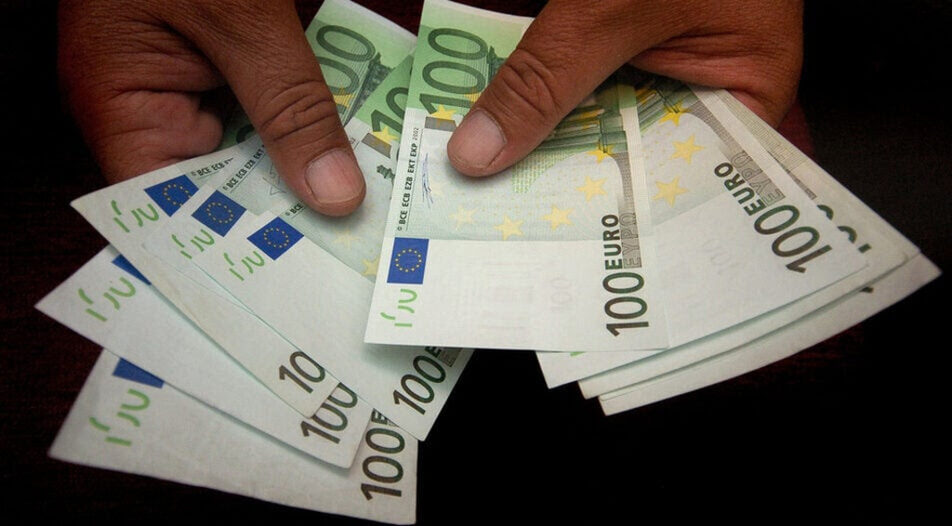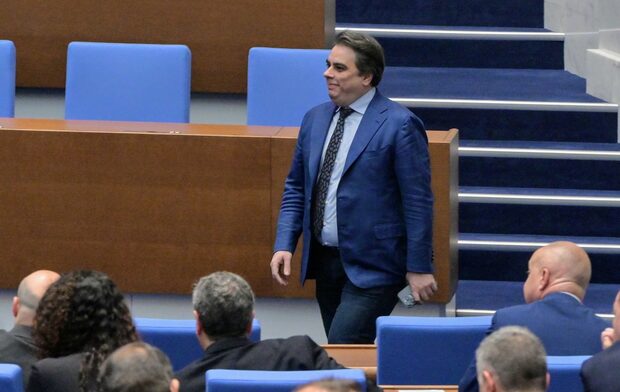I spend some (not a lot) of my time watching TV. It's mostly a waste of time, but I'm old fashioned and I like to buy newspapers, read paper books and from time to time do nothing and just stare at the TV box, without my fingers moving. Whenever I do, it's either sports, science or someone arguing with someone else.
This week, I found myself watching 4 economists argue about the expected euro adoption. This is probably the most boring thing you can imagine, save for a parliamentary committee - two pairs of men shouting at each other over graphs and debt levels. While listening to them talking about inflation, loans, and how bad things are in Croatia, which adopted the single currency 15 months ago, I suddenly realized what the problem with the eurozone entry is for lots of Bulgarians (46% as per the last Eurobarometer survey)
It comes from a very basic fact. And it's not that Bulgarians love their levs.
The main value of any currency is trust.
It's nearly impossible to trade with a currency that no one believes in. Hyperinflation is basically a collapse in trust in that currency.
Given that, why is it that we don't want to switch from our lev currency that's already been pegged to another, a far more powerful one? We surely trust the euro - almost no one in Bulgaria these days trades in dollars, which were everywhere in the 90s and the 00s.
It's because we don't trust the politicians and the way the system works. I know nobody anywhere trusts them, but we're talking about a different level here. We've mentioned it in the last newsletter. A whopping 61% of Bulgarians say they do not believe the country is governed by the will of its citizens. I've argued this is because for 17 years since Bulgaria joined the EU people have witnessed capture of institutions, draining of EU money into private pockets, a bank collapse and the inability of the local political system to provide even basic justice. Bulgaria remains the outlier in the EU in terms of high-or-mid level politicians with effective jail sentences: there are virtually none.
If you believe an impunity cabal is running the economy you'd be very scared to hear this cabal now wants to transfer it to another currency. You might not be able to explain your fear and use proxy metrics - be it that Bulgaria will be indebted heavily, or that the prices will go up, or that your money will go somewhere else - but behind it lurks the same pervasive thought: if they managed to steal billions from the EU and nobody did a thing, how are we going to be safe if they come up with a scheme to steal more money while in the eurozone?
The logical defense to this is that the European Central Bank (ECB) is a far better guardian of public finances than the Bulgarian National Bank (BNB). Yet Frankfurt is far away, the same way Brussels has been. And logic will always lose to gut feelings. The last two times we changed currency: after communism and after hyperinflation crisis of the 90s, are not happy memories.
So my reply to the eurozone pushers would be: convince the people that justice will be done when something wrong is done to them. Restore trust in the system a liitle at least. Then it can do wonders.
This newsletter is created with the help of
Martin Dimitrov
1. POLITCS THIS WEEK:
And on that point: millions missing from EU procurement
The European Public Prosecutor's Office - about the only EU institution that has the potential to turn the trust issue - has been active again this week in Bulgaria. This time Kövesi's people are targeting the Zheleznitsa road tunnel: the largest single investment made by the EU in the past few years. Turns out, one of the companies involved in the construction of the 100 mln. euro tunnel siphoned 11 mln levs, or almost 6 mln.euro to hollow companies and they then got withdrawn by people "with criminal records".
Not the first time
What's interesting is the fact that the press-release speaks of "companies and individuals also appearing in another ongoing EPPO investigation concerning infrastructure projects in the railway sector". The investigation in question was announced last August and follows the same link of hollow companies and people with criminal records withdrawing around 2.5 million euro from a 120 million railway procurement.
Now, those are not the same construction companies, nor (formally) the same owners or the same contracting institutions. Yet the money chain seems the same. You don't have to be Hercule Poirot to figure out where this leads.
The big question is
not how Bulgarian authorities have failed to notice this up to now. We know enough to dismiss them entirely. The big question is whether Laura Kövesi will go all the way and name not only the companies and the straw-men, but also those behind them.
Peevski vs. Denkov: Who's evil?
For several days, the former (and likely - future) partners forming majority in Parliament - GERB, WCC-DB and MRF - have been accusing each other and quarreling about how and whether they would govern again after the forthcoming early parliamentary elections.
The bone of contention this time was raised by outgoing Prime Minister Nikolay Denkov. Responding to questions on a Facebook Live broadcast, he described MRF leader Delyan Peevski as "the biggest evil that has ever happened to Bulgaria", accusing him for being the main reason why the country is going to yet another early election. Peevski did not spare any time responding and attacked Denkov for being "the weakest prime minister in the history of the country". In between their statements, GERB leader Boyko Borissov recalled WCC-DB's position that, at certain moments in the past few months, Peevski was "not such an evil at all".
The campaign is here
This whole exchange of fire marks the start of what the WCC-DB leaders say is "the start of the dirtiest election campaign" in Bulgarian history. The two camps, which used to rule together for nine months until March 6, now need to distance themselves from each other. And the campaign promises to be ugly indeed.
2. ECONOMICS:
Budget revenue stream dries up in March
From the moment Parliament approved the 2024 budget of outgoing Finance Minister Assen Vassilev, there has been criticism that he was too optimistic about revenues. His response was that filling the coffers would be a "tight but realistic and achievable" mission. However, data for the first three months of this year show that tax revenues are growing at a slower pace than planned. As of end-March, they are up just 2.5% on the same period in 2023, with those from indirect taxes - the largest revenue source, close to last year's levels. At the same time, this year the state is expected to collect 10% more tax and social security contributions compared to last year, and almost 15% more from VAT. The first three months of the year have traditionally been the weakest in terms of revenues, the question is whether the finance ministry would be able to catch up in the next three.
You won't have any money to spend! GERB and MRF restrict Vassilev
Just after midnight on Thursday, GERB and MRF pushed through a resolution in the National Assembly obliging the outgoing finance minister to take measures "to ensure the financial stability and fiscal liquidity of the Republic of Bulgaria," which practically heavily restricts Vassilev's ability to allocate funding in his last days in office. You know, just in case there are elections around the corner
Figures:
2,4% The revised annual inflation forecast for 2024 according to the Finance Ministry, which is half of what it predicted in its autumn economic review (4,8%) 3,2%Is the annual growth of bank loans for the first quarter of this year.
3. BUSINESS:
Plastics BorealisThe Vienna-based specialty chemicals company, majority owned by Austria's OMV, bought 100% of Bulgarian recycling plant Integra Plastics. The price is not disclosed, however with a 14 mln levs profit last year, the plant in Elin Pelin, near Sofia, is clearly worth tens of millions of euro.
4. ENERGY:
Enter and exit: TurkStream and Lukoil
During a parliamentary session that lasted from Wednesday night to Thursday morning, the MPs approved the establishment of two temporary inquiry committees, which would likely be used as PR tools during the upcoming dirty election campaign by WCC-DB and GERB, respectively. First, on the initiative of the WCC-DB reformists, the MPs launched a committee for the investigation of the "lost" roadmap for the creation of the TurkStream gas pipeline by the second and third GERB-led governments.
In response, GERB launched a "counter-committee" that would be tasked with evaluating the derogation from the EU sanctions for the use of Russian oil obtained by the government led by WCC-DB's Kiril Petkov in 2022 that benefited the Lukoil Neftochim refinery.
Everybody who has ever followed the work of these ad hoc committees knows their fate - they would be used as a platform for the fabrication and mass distribution of claims that are hard to prove and unlikely to be investigated during the upcoming election campaign, and would be forgotten soon after (especially if there is a new "assemblage" of political factions in parliament).
5. WATCH OUT FOR:
People: The new batch of ministers is here (which is why we're late this week) ! Kalin StoyanovThe minister of the interior turned out to be a real VIP. First, he was the sole person who incoming caretaker PM Dimitar Glavchev named as a likely member of his team in his first public appearance as candidate for the position of head of government. Apparently, Stoyanov's expertise is considered important by the ex-GERB cadre Glavchev. Secondly, it turned out that Stoyanov was one of the main apples of discord between WCC-DB and GERB during their failed negotiations over rotation of government.
Georgi Gvozdeikov
The minister of transport was a part of WCC-DB team and is obviously splitting from it, staying as a caretaker.
Vladimir Malinov
The current head of Bulgartransgaz is going to be a caretaker minister and is a vivid representation of what this cabinet is going to be for. Malinov was engaged in both the deals with Botas and for TurkStream and his appointment at this time is a significant development.
Violeta Koritarova
The new head of the Regional Ministry is an old GERB cadre and is the last evidence needed for who's going to run the country before the elections. As we've argued before, the Interior and the Regional Ministry are the two that matter before the elections.
Institution:
The Customs AgencyHas been thrown into a disarray. First, the agency lost its previous chief in February, when in a cunning move Finance Minister Assen Vassilev replaced Pavel Tonev by Petya Bankova (we've notified you in our Person of the Week back then). The idea was to reorganize customs ahead of Bulgaria's admission into the Schengen area by land from the beginning of 2025. After that, suddenly people began losing their jobs here and there at the Customs Agency, following signals from partner countries, and trafficking channels were broken up. And then the government fell. Just a week later, the State Agency for National Security, DANS, entered the Customs Agency and arrested Bankova and her deputy on charges of covering up cross-border channels for trafficking of illegal items.
The whole thing is a mess, and it's not going to clear up soon, which is a pity, given that customs are a vital element on which Bulgaria's full entry into Schengen depends
Place:
The Turkish border
You might remember our piece on the first private border in the EU. Well, things have changed a bit since then. The company which used to run sanitary checks on imports of plant and animal products at the border has been sidelined, but is suing the state. And it has been winning. So this week, the Council of Ministers decided to actually pay them to get out. They will receive 10 mln. levs and leave the dispute. Which is not a bad deal, considering that Bulgaria might not be able to retain control over its own border otherwise.
Кошута - Hind
After 3 years of legal battles, the new Sofia Municipal authority managed to destroy the illegally constructed "lodge" (which was the size of a hotel) of businessman Rumen Gaytanski a.k.a. the Wolf in the Iskar game hunting farm Iskar near Sofia.Something curious happened right before that. While trying to enter the state-owned hunting farm and destroy the building, local authorities met with significant resistance.
In an attempt to delay the demolition, the director of the hunting farm produced an order forbidding entry into the premises because it would hurt "pregnant hinds".
I spend some (not a lot) of my time watching TV. It's mostly a waste of time, but I'm old fashioned and I like to buy newspapers, read paper books and from time to time do nothing and just stare at the TV box, without my fingers moving. Whenever I do, it's either sports, science or someone arguing with someone else.
This week, I found myself watching 4 economists argue about the expected euro adoption. This is probably the most boring thing you can imagine, save for a parliamentary committee - two pairs of men shouting at each other over graphs and debt levels. While listening to them talking about inflation, loans, and how bad things are in Croatia, which adopted the single currency 15 months ago, I suddenly realized what the problem with the eurozone entry is for lots of Bulgarians (46% as per the last Eurobarometer survey)












